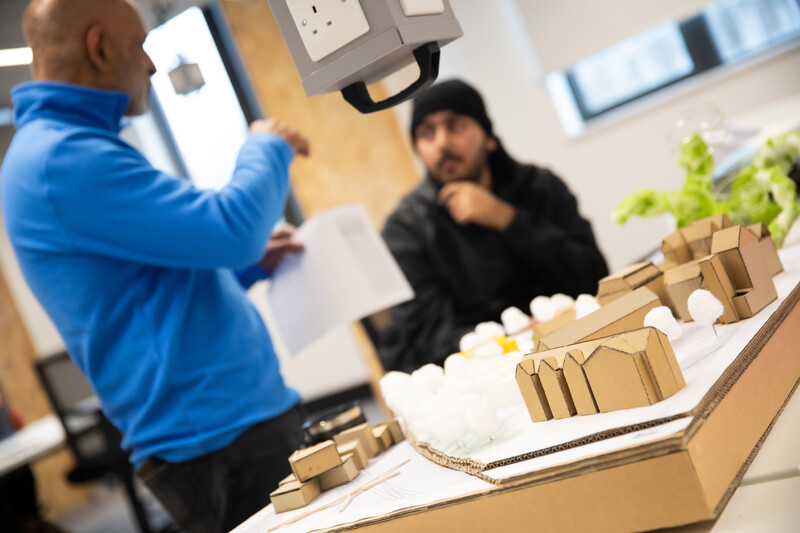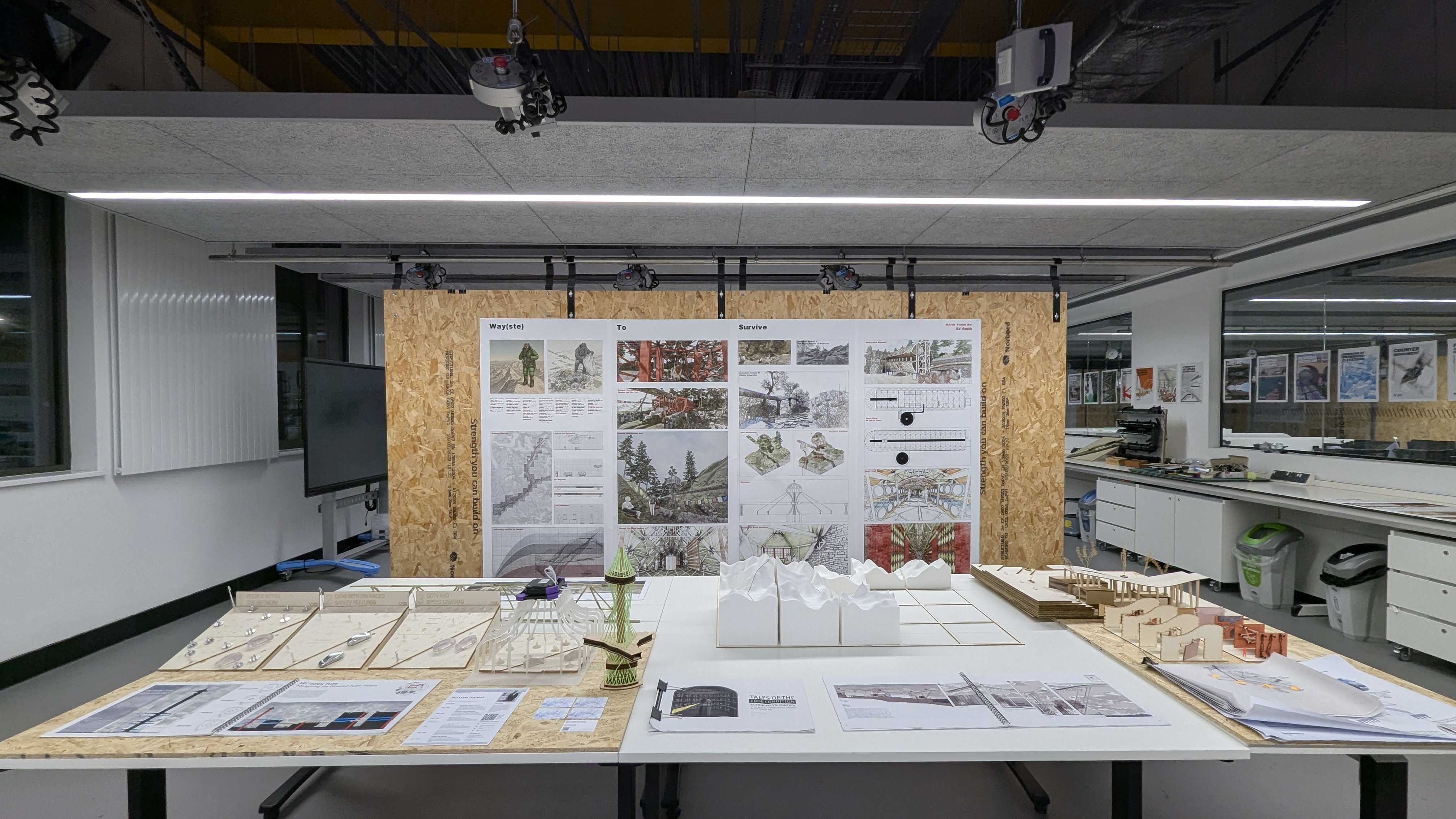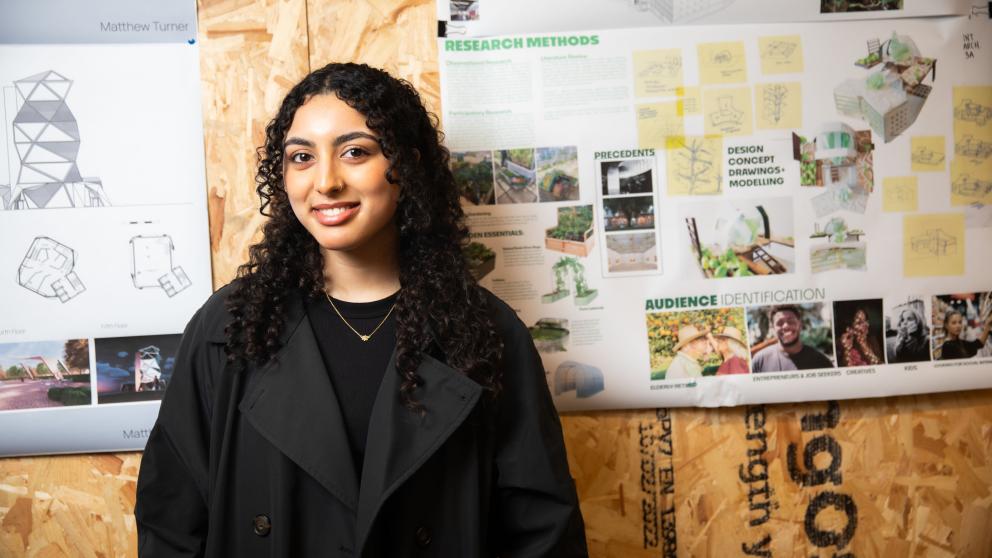
Architecture
Full-time
Two year
September 2026
In a nutshell
The heart of the world’s first industrial city is our laboratory, you will be based in our design research studios at Peel Park. The special features of the course are framed by our identity as the Salford Laboratory of Architecture (S-LAB) - a space and forum through which to explore contemporary ideas of place, culture and technology that places our internationally and academically diverse student cohort at the heart of architectural experimentation. This position leverages the University of Salford’s reputation and world leading facilities to engage and collaborate with other disciplines, external organisations, and industry partners through live-projects. We are ideally placed within a global media city that has become a powerhouse of the UK's digital economy and is widely recognised as a national and international hub for the creative industries and a test-bed of innovation in the built environment.
Our Masters degree in Architecture is delivered over two years and enriched with theoretical and research skills, knowledge exchanges, and practice-based learning that refines and develops your confidence. Our programme and modules instill a sense of care for socio-environmental systems, imaginative curiosity and techno-ecological ingenuity; it constructs its encounter with the architectural through art, philosophy, and science.
The Master of Architecture (MArch) at Salford is now fully validated by the Royal Institute of British Architects (RIBA) — awarded with commendations — and prescribed at Part 2 level by the Architects’ Registration Board (ARB). The RIBA validation panel praised the programme for its curriculum innovation, integration of research-led teaching and strong engagement with industry and community partners. This recognition confirms that studying the MArch at Salford means joining a course at the forefront of architectural education.
When you complete the MArch, alongside a recognised Part 1 qualification, you can progress to Part 3 and take the final step towards becoming a registered architect and RIBA member. Due to the programme’s strong emphasis on research and urbanism, you will also be well prepared to continue into an MPhil or PhD at Salford, or to pursue alternative career pathways in urban design and related fields.
At Salford, you’ll study on a programme that not only meets the highest professional standards, but also challenges you to grow as an independent, creative, and socially engaged architect — ready to shape the future of the profession.
National Recognition for Salford MArch Student: Edward Smith
2025 marked an important milestone for the MArch, with our students gaining notable external recognition for their work. Two students achieved 2nd and 3rd place in the prestigious Manchester Society of Architects (MSA) Future Architect Award, rising above hundreds of entrants from across Manchester and highlighting Salford’s strengthening profile in national architectural education. These awards represent the first time Salford students have been recognised at the event.
Edward Smith secured second prize for his project Way(ste) to Survive, which was also nominated for the 2025 RIBA President’s Medals and the 2025 AJ Student Prize.
The project responds to the mounting ecological crisis on Everest. Waste is both symptom and symbol: a trace of tourism, a weight borne by Sherpas, and a signal of infrastructural failure. Ed proposes an architectural strategy that treats waste not as burden but resource — flowing between altitude thresholds, sustaining new typologies, and redistributing value within the Khumbu region.
See more of Ed’s work on RIBA's website and Architects Journal.
Start your MArch Architecture study journey
Register for our next Open Day where you can learn more about the course, tour our impressive studios and meet the tutors
You will:
- Enhance your knowledge of architecture design thinking to explore the relationships between ecological and human systems
- Experience an immersive and dynamic studio-based learning environment, complete with 3-D printers, laser cutters, portable workspace and digital tools and technologies to articulate an architectural position
- Develop critical understanding of the professionalism, duties and personal responsibilities of architects to clients, building users, constructors, co-professionals and the wider society
students accepted
Course accreditations
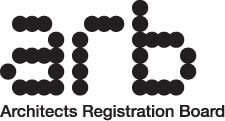
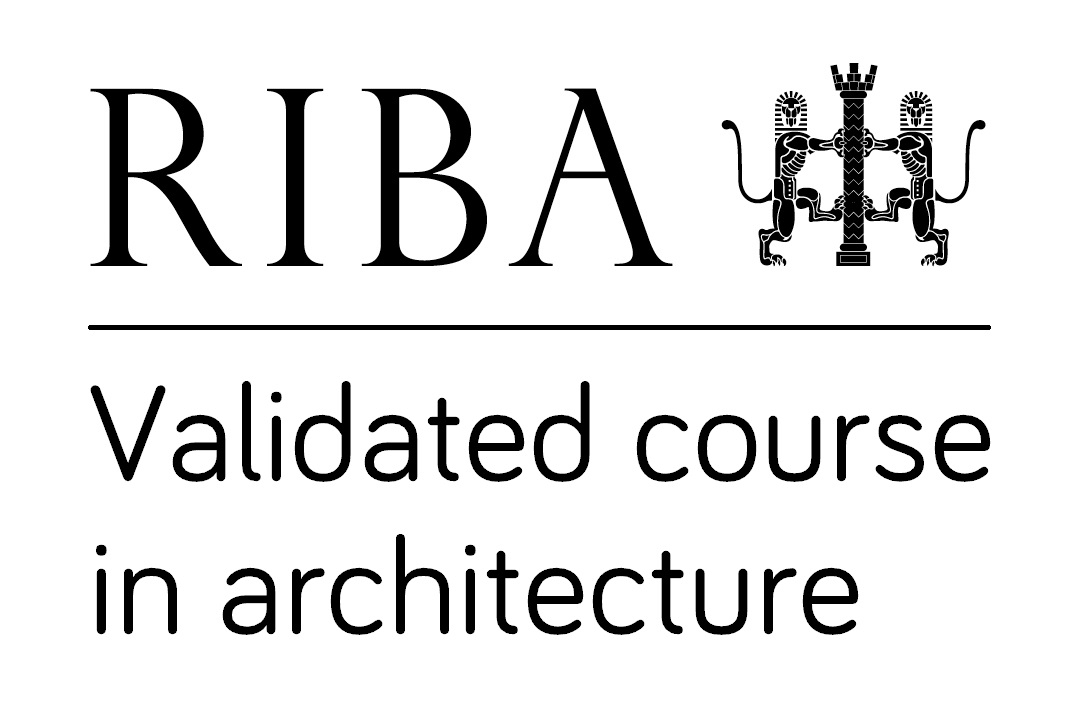
This is for you if...
You intend to enhance your knowledge of architecture and design research to explore relations between techno-ecological and socio-technical systems.
You aspire to contribute to our dynamic studio-based research-led design culture.
You are curious to imagine and create cultural understandings of architectural research through fieldwork and ethnographic, archival, speculative, computational and artistic methodologies.
You seek critical understanding of the professionalism, duties, and personal responsibilities of architects to clients, building users, constructors, co-professionals, and the wider society.
You have the motivation to join a research-led community and a course that builds on your experience inhabiting different forms of climate catastrophe and social injustices.
You are inspired to work closely with our faculty to develop polemical propositions for speculative, research-informed architectural futures.
All about the course
Course delivery
From our location in the world’s first industrial city, we adopt the position of a socially-engaged practitioner, and put practice-based learning and industry collaboration at the heart of your learning experience.
Delivered over two years, our Architecture Masters degree course is based on a 240-credit modular structure. Each module is carefully designed to provide learning and appropriate skill development consistent with its position in the overall structure. Intensive 'diagonal' workshops are embedded throughout.
- In year one, you will experience Design Studio modules in Performative Technologies and Urban Ecologies, which include placement experience in architectural and design offices with local industry partners. This is complemented with modules in Digital Design Technologies, Histories and Theories and Practice Management and Law
- In year two, you will experience further Design Studios, which include design workshops with industry partners from the UK and Europe. Year two culminates with a semester-long design research project (thesis) in which you will articulate an architectural position based on professional practice
The course timetable is designed to allow students with other commitments to structure their week around teaching sessions.
Learn more about the current course modules in the section below.
Industry collaboration
We have a fantastic working relationship with numerous local architecture practices, such as:
- BDP
- Studio Power
- OMI Architects
- Buttress Architects
- Project 3 Architects
- Tim Groom Architects
Course team
The MArch postgraduate course is delivered by an academic team with extensive research and industry knowledge. The architecture department at Salford is globally-renowned, with strong regional, national and international industry links.
Course leader: Ian Owen
Histories, Theories & Methodologies
This research methods module helps you develop your approaches to design research and futures through fieldwork, archives, and speculation on/through/for architecture. You will learn about the histories of theories and methodologies of our discipline and those that influence it from philosophy to linguistics, computation, anthropology, geography, and ecology, among others. The module considers the unbuilt, the literary, the cinematic, and the interactive through an architectural lens. It examines books, magazines, and the discipline’s periodicals, together with artefacts produced in exemplar architectural practices and academic studios. By the end of this module, you will establish a critical versatility in several modes of knowledge production and an ability to create and validate transdisciplinary futuring practices such as architecture.
Design Studio 1
This studio module is practice-based and research-led through design workshops. The interdisciplinary future of Architecture and its ecological associations across the urban, rural, and landscape scales are a central concern for the studio. It is framed within contemporary and relevant eco-environmental research themes and aims to produce outputs grounded in landscape urbanism and urban ecologies. The studio allows you to engage with relational and systems thinking in urban analysis, enabling you to experiment with design research, digital technologies, and communication skills. It embeds core principles in the first year of design exploration, expanding the remit of architectural research and extending its thought process to mobilities and flows across the landscape.
Design Studio 2
This studio module is practice-based and research-led through group seminars, workshops, and tutorials. The transdisciplinary future of Architecture and its relationships with theory and experimentation are a central concern for the studio. It is framed within contemporary and relevant socio-political research themes and aims to produce outputs responsive to global challenges and accelerating technological transformation. The studio allows you to engage with speculative, performative, and ethnographic methodologies in architectural research and design, enabling them to experiment with digital technologies and pursue novel solutions. You will develop your communication skills in various representation and narrative techniques.
Construction Science, Technologies & Law
This practice module helps you develop a critical understanding of the nature of professionalism and the architect’s duties and responsibilities to clients, building users, constructors, co-professionals, and the wider society. The relationship between Technology, Innovation, and Law is central to the module. It takes a philosophical stance and develops a practical grasp as to how planning law, the Building Safety Act, building regulations, the Construction Design Management regulations, and International Standards, such as BIM, affect architectural practice. The module focuses on the role of the Principal Designer within the design team and on developing the independent learning abilities required for continuing professional development. You will explore emerging technologies, innovative methods and models of procurement, entrepreneurship, manufacturing, and interdisciplinary practices.
Design Studio 3
Design Studio 3 is one of a pair of design research modules running in three consecutive phases across the final year. It provides an experimental platform which informs the design thesis (Design Studio 4) and typically establishes the programme or content of the final design thesis, involving a design-led investigation of your matter of concern. Design Research methodologies, coupled with the Dissertation, provide conceptual frames through which you will critically engage with the formulation of your proposition and communicate its intent.
Design Studio 4
Design Studio 4 typically establishes a scale shift in design proposals, from site strategy to programme and also from form to programme/programme to form, testing aspects of the proposition made between the dissertation and Design Studio 3. The module is structured in three phases across the year includes an investigation of significant speculative and technological strategies that are critical to the thesis. Your Thesis concludes in a public showcase which communicates the final resolution of the project and all associated research, exhibited to professional presentation standards and includes a critical study of a significant aspect of the proposition as a work of architecture.
Dissertation
The Dissertation provides an opportunity for you to explore a research topic that relates your interest in a matter of architectural concern through the production of an extended piece of scholarly academic media (7000 words). Extending your engagement in Histories Theories and Methodologies from year 1 into year 2, in the Dissertation, we encourage you to develop the subject of your enquiry or the matter of concern for your thesis. The research dissertation is to be developed in parallel with your interests, and career aspirations and whilst submitted at the end of the first term should continue to inform the exploratory design research of Design Studio 3 through three phases and conclude in re-presentation of the dissertation with the thesis at public exhibition. The subject chosen will therefore reflect the symbiosis between design practice and theory and allow for individual specialist scholarship to be located within a deeper understanding of an architecture driven by socio-political, accelerating technological, and eco-environmental matters of global concern.
We take a flexible approach to our course delivery that promotes diversity and inclusivity and provides a blended learning experience, which will vary to meet specific programme requirements. This learning time includes formal lectures and interactive activities such as seminars, tutorials, practical sessions, laboratory and studio learning. Smaller classes may be used to support collaborative activities such as project and group work and presentations. A range of different assessments and feedback is offered to meet the needs of both our diverse student body and specific subject needs.
Our postgraduate taught courses are normally made up of 30 credit modules which are equal to 300 hours of learning time, or 15 credit modules which are equal to 150 hours of learning time. A Master’s degree typically comprises 180 credits, a PGDip 120 credits, and a PGCert 60 credits.
Please note that exact modules and content offered may vary in order to keep content current and, for courses that offer optional modules, may depend on the number of students selecting particular options. When accepting your offer of a place to study on a programme with optional modules, you should be aware that optional modules may not all run each year. Your tutor will be able to advise you as to the available options on or before the start of the programme. Whilst the University tries to ensure that you can undertake your preferred options, it cannot guarantee this.
School of Science, Engineering and Environment
Rising to the challenge of a changing world, our postgraduate courses are designed to shape the next generation of urbanists, scientists, engineers, consultants and industry leaders.
Shaped by industry, and delivered by supportive programme teams, you can develop the skills to take your career potential further.
Facilities
Salford Laboratory of Architecture (S-LAB) is a forum exploring contemporary ideas of place, culture, and technology. Reflecting the University of Salford’s strategy to prepare its students for the future, S-LAB is an environment for research-led and industry-focused experiences. The laboratory thrives in the techno-industrial milieu of the region, in cutting-edge campuses and buildings, and in the ambitious student body it attracts.
After your MArch Architecture degree
Employment
With a MArch Architecture qualification, you are well on your way to becoming a chartered architect. Architecture is a highly-valued profession throughout the world. As a qualified architect, you will work throughout the built environment profession on a diverse range of projects and developments.
As a MArch Architecture graduate, you are likely to find employment opportunities with architectural practices, design practices, and engineering consultancy firms. There may also be opportunities with central government, local authorities, property developers, building contractors, housing associations, financial institutions, major retailers and manufacturing companies.
Further study
On successful completion of your Part 1 and Part 2 architecture studies, you can progress to the RIBA Advanced Diploma in Professional Practice in Architecture (Part 3), validated and prescribed by the RIBA and ARB respectively. You will need to engage with the required 24 months of professional practice before sitting the Part 3 exam.
You might also choose to take your subject interest further with postgraduate research. Our Centre for Urban Processes, Resilient Infrastructure and Sustainable Environments is home to PhD and Research Master’s opportunities exploring how we can enhance our built environments at local, national and international scales.
Explore our Doctoral School to learn more about research training, support and opportunities.
How to get accepted onto the MArch architecture course
Portfolio
Applicants are required to submit an electronic portfolio of work as part of the application process. Applicants who can evidence a passion for architecture, and can demonstrate they can achieve at a high level, will be considered for an interview to receive a place on the course.
Your portfolio should include relevant work from an undergraduate architecture course which shows achievement of ARB/RIBA Part 1 (or non-UK equivalent), plus any work completed in practice which might be relevant. Portfolios should demonstrate a range of creative and representational media, including various forms of drawing and three-dimensional making. Relevant written work should also be included.
Visit the ARB website for more information on the ARB/RIBA Part 1 criteria.
English language requirements
All of our courses are taught and assessed in English. If English is not your first language, you must meet our minimum English language entry requirements. An IELTS score of 6.0 (no element below 5.5) is proof of this, however we do accept a range of equivalent qualifications.
Read more about our English language requirements, including information about pathways that can help you gain entry on to our degree courses. If you do not have the English language requirements, you could take our Pre-Sessional English course.
International applications
Please check international intakes for the latest information and application dates.
Undergraduate degree
Applicants for the Master of Architecture (MArch) programme will typically have a first degree in architecture from an accredited undergraduate programme (normally with ARB/RIBA Part 1 exemption).
Typically students will have achieved a minimum of an upper second class honours degree (2:1) in a BSc/BA Architecture course. Whilst it is not a requirement for entrants to have completed ARB Part 1, all Parts (1, 2 and 3) will need to be completed in order to be admitted to the UK Register of Architects.
International student entry requirements
We accept qualifications from all around the world. Find your country to see a full list of entry requirements.
Accreditation of Prior Learning (APL)
We welcome applications from students who may not have formal/traditional entry criteria but who have relevant experience or the ability to pursue the course successfully.
The Accreditation of Prior Learning (APL) process could help you to make your work and life experience count. The APL process can be used for entry onto courses or to give you exemptions from parts of your course.
Two forms of APL may be used for entry: the Accreditation of Prior Certificated Learning (APCL) or the Accreditation of Prior Experiential Learning (APEL).
For more information or enquires about this scheme, please contact: AdmissionsSEE-PGT@salford.ac.uk
The cost of studying MArch Architecture
| Type of study | Year | Fees |
|---|---|---|
| Full-time home | 2026/27 | £9,790 per year |
| Full-time international | 2026/27 | £17,520 per year |
Additional costs
You should consider further costs which may include books, stationery, printing, binding and general subsistence on trips and visits.
International student scholarships
If you are a high-achieving international student, you may be eligible for one of our scholarships. Learn more about our latest international scholarships.
All set? Let's apply
Enrolment dates
Student information
Terms and conditionsUCAS information
Course ID K102
Institution S03

